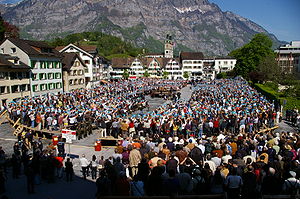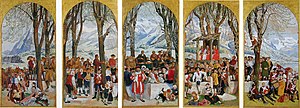Landsgemeinde
The Landsgemeinde ("cantonal assembly"; German: [ˈlantsɡəˌmaɪndə], plural Landsgemeinden) is a public, non-secret ballot voting system operating by majority rule.
The Landsgemeinde has been the sovereign institution of the Swiss rural cantons since the late Middle Ages, while in the city-cantons such as Lucerne, Schaffhausen, or Bern, a general assembly of all citizens was never established.
Similar assemblies in dependent territories were known under terms such as Talgemeinde (for Talschaften, used in Ursern, Hasli, Obersimmental), Teding (Engelberg), Parlamento (Leventina), and Zendgemeinden (for the Zenden or districts of Valais), but also as Landsgemeinde in Toggenburg and in parts of Grisons.
[1] At the Landsgemeinde, citizens of a district or canton assemble annually in a public space under open sky to vote on a series of ballot questions.
Depending on the canton, they raise their hand or voter identification card to either accept or reject the motion, which constitutes a non-secret ballot.
In Glarus, because of the high level of deliberation and possibility for citizens to propose an amendment of an existing law article or the introduction of a new one, the Landsgemeinde lasts between 2 and 4.5 hours on average.
In Appenzell Innerrhoden and Glarus, the modernization of the institution, for example through the potential introduction of electronic vote-counting systems is debated, but no political party is opposed to the maintenance of the Landsgemeinden.
For instance, the 4th Cyber-Landsgemeinde was organised on April 6, 2016 in Bern, with the aim to use democratic deliberation to foster reflections and find solutions related to the topic of cyber-security.
[8] Likewise, the urban municipality of Kloten implemented in 2012 a version of the Landsgemeinde to deliberate on the allocation of funds to local projects, which enabled for example the construction of a new Kindergarten.
[10] Paul Lucardie (2014) notes for example that: "Evidence suggests that attendance at assemblies in Appenzell and Glarus, as well as most town meetings in Vermont and possibly also in ancient Athens, has always been limited to roughly twenty per cent of the citizenry.
On the other hand, according to the ancient Greek tradition of parrhesia, literally "saying everything", a public assembly could teach individuals to express their opinions with frankness and collective responsibility.
[16] Studies of outcomes of the Landsgemeinde in various administrative divisions (Schaub 2012, Gerber & Mueller 2014[citation needed]) seem to suggest that proper preliminary deliberation can help reach better decisions defined by the "unforced force of the better argument" (Habermas, 1992).

